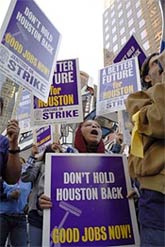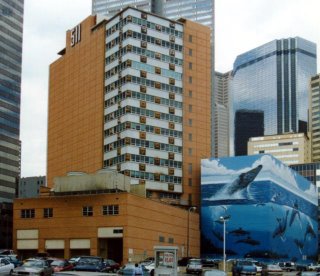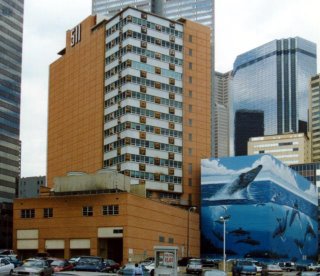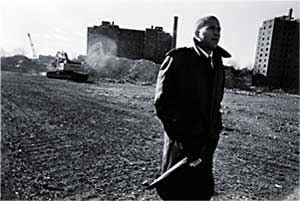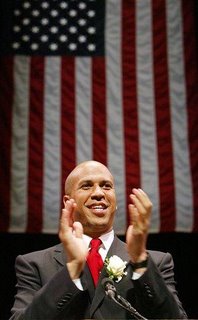How about that courageous City Council in
Farmers Branch, Texas?
Last Monday evening they voted
unanimously to make English the official language of the town of 28,000 and to make it illegal for apartment owners to lease housing to those who could not prove that they were legal residents of the United States. The council also authorized the city's police department to seek special training so that the immigration status of persons in custody could be determined. In essence, Farmers Branch police officers will become immigration agents.
I say courageous because of what they
didn't do.
Tim O'Hare, the City Council member who got the ball rolling on this aggressive "reform" movement, wanted his fellow council members to penalize employers who hire undocumented workers. He also wanted funding cut off for youth programs serving undocumented children.
I guess apartment owners--
there are only 15 apartment properties in the town--are an easier, less politically volatile group than business owners who have grown accustomed to the hard working, low-cost labor force that lacks nothing but proper documentation and increased opportunity.
And, really now, only the Grinch who stole Christmas would have the gall to crush summer programs for little kids, don't you think?
There is so much to get at here, I truly don't know where to begin.
But, let me give it a shot!
First, I thought municipalities were about potholes, public safety, parks, libraries, economic development and civic pride? When did immigration control become a local issue in a small town like Farmers Branch?
I know, I know, the feds aren't doing their job; but wouldn't it be more productive to lobby the U. S. Congress than to punish a segment of the population inside the city limit signs of just one place?
And by the way, what message has the United States' enforcement policies been sending for well over a decade to persons south of our border who simply seek an opportunity to better life for themselves and their families? How about the message of the millions of employers who have hired these workers, even in Farmers Branch?
In my view, President Bush's comprehensive plan to deal with the millions of undocumented immigrants through a guest worker program seems on the mark. Securing the borders going forward with stepped up security and by negotiating with the Mexican government as a part of the plan also seems prudent.
But the notion that we can simply kick out 12 million people is ludicrous. Just here I remember the 500,000 people who march peacefully through Downtown Dallas on Palm Sunday last April.
The politicians who exploit this issue to arouse a fearful, uninformed public for their own political benefit should be ashamed. None of us should pay any attention to them either.
Second, much of what Mr. O'Hare and his colleagues claim is
simply not true.
Let's be very, very clear: Undocumented residents of Farmers Branch
do pay taxes.
Think about it.
No one escapes sales or property taxes.
Anyone who buys anything pays sales tax.
Anyone who pays rent contributes to the property tax bill paid by the property owner.
Then, there are
Social Security taxes that
millions of undocumented workers pay into the system annually using bogus Social Security numbers. At last count this amount equaled 10% of the Social Security reserve fund each year.
These are tax dollars from which these workers will never benefit.
As a matter of fact, these dollars will help fund my retirement, not theirs. The
Social Security Administration has no interest whatsoever in seeing this flow of income shut off.
Third, what about the economic impact of undocumented workers in a place like Farmers Branch?
The service and construction industries draw large numbers of workers from this growing and readily available pool. According the
Inter-American Development Bank,
90% of the wages earned in the U. S. by immigrants stays here. During 2006, immigrants will contribute
over $50 billion to the Texas economy--again, dollars that stay here and circulate in our communities,
including Farmers Branch.
What about the effect of immigrants on wages for U. S. citizens? According the studies, the impact is negligible. Those most affected are high school dropouts who see wages fall by about 8% because of the competition of immigrant labor, a reality that could be offset by staying in school.
Arguments about the cost of providing public education and healthcare come across as disingenuous to me. Working to assure the future of all of our children seems to be the kind of public, civic investment that ultimately benefits everyone, and for a long time to come.
The labor force is here and it counts in the millions. Making sure every child is learning and growing benefits the whole of our culture and all of our communities. The same can be said for adequate medical care for every resident.
Finally, call it what you will and argue with me all you like, we must face the reality of the racism, classism and xenophobia bound up in this extraordinary move.
The Farmers Branch City Council has taken action to ban an entire group of people.
"Move to Garland, stay in Dallas, go to Denton, but understand us: you are not welcome here because of who you are and where you are from."
I find this action shocking and abhorrent.
But on second thought, maybe it's not so surprising, especially for a person like Mr. O'Hare. I'd bet you a dollar to a hole in a donut he has his eye on the Texas House of Representatives and beyond (
see comments above about politicians who exploit the fears and prejudices of voters).
Ironically, O'Hare and three of his fellow council members attend the same large and influential church in Farmers Branch. So, I assume they consider themselves to be people of faith. I expect that the other two members of the council also attend church.
It makes me wonder if they are reading the Bibles they likely will carry with them into their houses of worship this Sunday. After all, the message of this book is really fairly clear on the subject of how to treat immigrants.
Just a few examples seem in order:
"Do not mistreat or oppress a foreigner; remember that you were foreigners in Egypt." Exodus 22:21.
"When an alien lives with you in your land, do not mistreat him. The alien living with you must be treated as one of your native-born. Love him as yourself, for you were aliens in Egypt. I am the Lord your God." Leviticus 19:33-34
"God's curse on anyone who deprives foreigners. . .of their rights." Deuteronomy 27:19
"The people of the land practice extortion and commit robbery; they oppress the poor and needy and mistreat the alien, denying them justice. . . .So I will pour out my wrath on them and consume them with fiery anger, bringing down on them all they have done, declares the Sovereign Lord." Ezekiel 22:29, 31
I'm thinking the Farmers Branch City Council needs to reconsider its action.
How about you?
